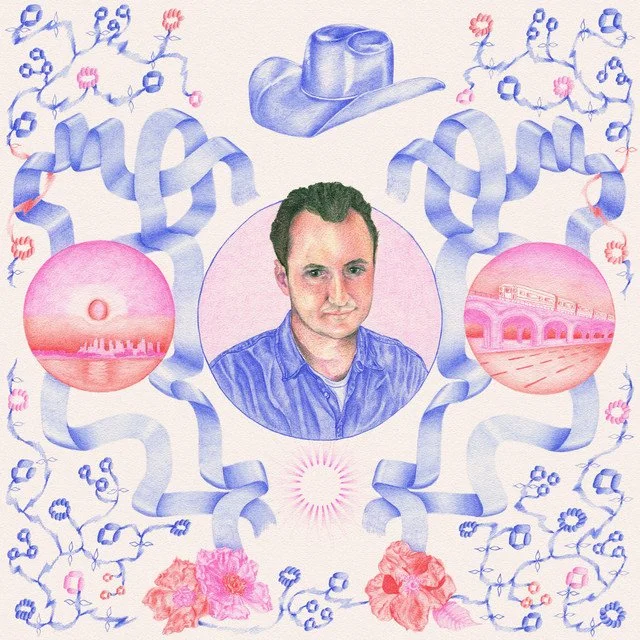Dougie Poole Renews Country Music With “The Freelancer’s Blues”
Country music set in the city.
“He's vapin' on the job / To spice it up and cool it down / Forget his pain, forget his place / Forget this game, forget this race / Forget this town / Forget the nightmares in the news / Forget these old computer blues” —Dougie Poole, “Vaping on the Job”
It’s a distinctly shitty time of year for me. When the winter overstays its welcome. I can’t go ice fishing or sledding, but the ponds near me are still thawing, and the only mushrooms up yet are wood ears and oyster mushrooms, which I can find in the wild in two seconds or buy from a grocery store for a reasonable price—well, reasonable in this era. To stay sane, I have been listening to new music. And I have discovered a masterpiece.
I should probably clarify my relationship with country music. I am not a “country fan.” I am into metal, classical music, Kanye albums, and I also enjoy being around less wholesome rap music. Nonetheless, I like some old country: Johnny Cash, Merle Haggard, Waylon Jennings, Townes Van Zandt, and John Prine, among others.
I feel out of place listening to country. I am not a farmer’s son. I hunt and fish, but I cringe at that being a pop-culture statement, abused by some corporate suit in Nashville. I drive a Toyota Hybrid, not a pickup. I read Countere and own multiple firearms, but don’t enthusiastically subscribe to an industry that essentially regurgitates Americana covered in the slime of advertisements for beer companies and the military-industrial complex. I used to live in a tiny apartment in a big city in the Midwest, and I have liberal friends who can appreciate some of my reactionary ramblings. In short, my relationship with country music is stunted by my relationship with the America that isn’t country.
Fast forward to my desperate searches on Spotify. I come across a newish record (June 2020) by an artist named Dougie Poole. It’s called The Freelancer’s Blues. It resolves a complicated relationship I have with an entire genre. My hunting camo and tracksuit and chain have seemingly merged into a coherent whole, a dialectic of dissonant subcultures resolved before my very eyes.
There is quite a bit to unpack in The Freelancer’s Blues: one theme that recurs through the album is the primal need, the yearning, for space, combined with an acknowledgement of all sides of the opportunity and drudgery of city life. For instance, on the song “Los Angeles,” the singer has his desire for warmer weather, more space, and the open highways of the West clipped by his local needs to take care of his mother, his lover, and the fact that winter might be a “state of mind” that a warmer place cannot fix. On the track “Vaping on the Job,” it is as much in the ritual of briefly escaping their office jobs as it is in the actual vaping itself that provides solace to the characters depicted. The songs posit that people with MFA degrees are just as much spiritually in need for an escape from the globalist, capitalist labor farm as any traditionally masculine, redpilled country boy.
This is not without a recognition of the paradox Dougie Poole dwells in. In the song “Buddhist for a Couple Days,” reflecting upon the eponymous activity, Poole belts out “Here I am a red-blooded American cliché.” He has become both a red-blooded American country singer and a cliché blue-state Eastern philosophy experimenter, working through anomie and stress with meditation, but being so acclimated to a state of fast living that he immediately leaves Nirvana after getting there. His nervous breakdown over modern life leads to the Zendō and back under the harsh neon lights of hipsterdom.
The album does its best at telling stories. This is its greatest act of incorporation of country into what is objectively a quite urban album. Each tale of heartbreak recorded, each act of attempting to cope with the stressors of life in New York, is belted out not unlike a folk song of old. It conserves an aspect of the past without making it kitsch, as so much country descends to with ballads that more or less could’ve been written 70 years ago.
The Freelancer’s Blues is Townes Van Zandt meets the Ramen Bar and Independent Bookstore. It is a cybernetic hand pulling the trigger of a Ruger Old Army. In a time when agriculture has centralized to a point where “the country” is itself a kitschy fantasy in many respects, the album leads the musical form to a point of refuge in unfamiliar territory. Dougie Poole finds himself at least somewhat romantically captivated by his modern landscape, and the modern landscape stares back in each song, finally accompanied by the plucking of acoustic guitar and a baritone voice of yore.
There is a sort of consciousness and intentionality with which Dougie Poole writes his lyrics, and I anticipate more good things from him in the future—The Freelancer’s Blues is only his sophomore effort. He knows what he is doing; he knows how he is subverting certain traditions while preserving others. In these times, it is bursts of creativity like this that might count for something genuinely “conservative” and not just a mere LARP. At least, this might be something we can hope for and try to create ourselves. Dividing by music has been unproductive: all we’ve gotten is Toby Keith on one side and Grimes on another. We need more country urbanites and perhaps a few urban yokels too.
Other Articles You May Enjoy
The Countere Guide to Mushroom Hunting

